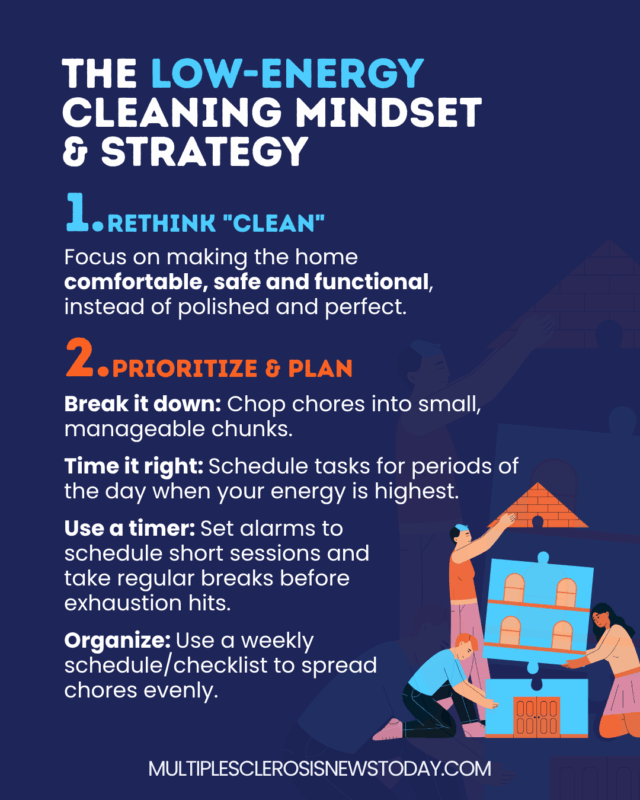
MS and housekeeping: Cleaning strategies that won’t drain your whole week
Last updated Sept. 30, 2025, by Roslyn Marano
If you have multiple sclerosis (MS), everyday tasks like housekeeping may feel overwhelming, especially when fatigue and mobility challenges arise.
Yet maintaining a clean and comfortable home still matters, as it can support both your physical comfort and emotional well-being.
The good news is that house cleaning with chronic illness doesn’t need to be perfect. By shifting your mindset and adopting some cleaning tips for MS, you can create a low-energy cleaning routine that reduces fatigue, saves time, and keeps your living space manageable throughout the week.
Rethink what cleaning means
Cleaning when you have MS may mean redefining what “clean” looks like to you and shifting from perfection to practicality. Instead of aiming for polished details, focus on making your home comfortable, safe, functional, and supportive of your daily needs.
Shifting your mindset this way can ease stress, help you save energy, and prevent overexertion.
Prioritize and plan
Because fatigue and MS often go hand in hand, planning is key. Breaking chores into smaller chunks can make them more manageable, while scheduling tasks during higher-energy parts of the day can help reduce the risk of burnout.
Short, timed sessions often feel easier than long cleaning days, and matching chores to when you feel strongest can make your routine more sustainable.
Staying organized with tools like checklists or a weekly cleaning schedule for MS can also help spread chores evenly across the week and ease the mental load.
Room-by-room strategies
By dividing chores by room and using certain adaptive cleaning techniques, you can create a low-energy cleaning routine that helps you conserve strength while keeping each space tidy.
Kitchen
Wiping counters daily with premoistened wipes or spray-and-go cleaners can help prevent buildup without heavy scrubbing. And using sit-down cleaning methods, such as keeping a stool nearby while prepping food or washing dishes, can reduce strain and make tasks feel more sustainable.
Bathroom
Bathrooms can be high-effort spaces, but small adjustments can make a big difference.
For instance, you can reduce scrubbing by using leave-in shower sprays. Cleaning in small sections and tackling one area per day, such as the sink or toilet, can further reduce strain and keep your bathroom clean.
Bedroom
Maintaining your bedroom can be easier with some simple adaptations. Making your bed while seated can reduce the strain on your body, and using rolling laundry baskets can make transporting your clothes to the laundry room less tiring and more efficient.
Living room
The living room often gets a lot of use, so focus on what matters most. Instead of dusting every inch of the space, focus on high-traffic areas, and consider investing in a lightweight or robotic vacuum to save energy without sacrificing cleanliness.

Tools and tricks to make cleaning easier
A comfortable cleaning setup can make managing household chores far less draining for people with MS.
For example, having specific cleaning tools for MS on hand, such as long-handled dusters, lightweight vacuums, or mops with swivel heads, can minimize bending and lifting.
Additional energy-saving cleaning tips include:
- Store supplies in multiple rooms: Avoid carrying items back and forth by storing cleaning supplies in various rooms.
- Declutter for easier movement: While decluttering with limited energy may feel daunting, having less clutter in the house may help reduce falls and make it easier to move through your space.
- Simplify tasks like laundry: Not everything needs to be folded perfectly. Placing bed sheets or towels in a basket instead of folding them can save time and energy.
Ask for help when needed
Managing chores with MS doesn’t mean doing everything yourself. Asking family, friends, or caregivers to help with heavier chores can ease the burden.
If your budget allows, scheduling a monthly deep clean with a cleaning service can free up your time to focus on light housekeeping, such as quick tidying or wiping surfaces, which may feel more manageable day to day.
Listen to your body
One of the most effective cleaning hacks for chronic illness is listening to your body’s signals. Resting before exhaustion sets in is often more helpful than trying to power through.
Learning how to clean with MS fatigue often means pacing yourself, scheduling shorter cleaning sessions, and taking regular breaks to prevent burnout. Timers or alarms can be used as reminders to pause, and building routines around your unique fatigue patterns makes chores more sustainable.
By using MS-specific cleaning strategies, leaning on support when needed, and respecting your energy, you can maintain a comfortable living space without draining your whole week.
Multiple Sclerosis News Today is strictly a news and information website about the disease. It does not provide medical advice, diagnosis, or treatment. This content is not intended to be a substitute for professional medical advice, diagnosis, or treatment. Always seek the advice of your physician or other qualified health provider with any questions you may have regarding a medical condition. Never disregard professional medical advice or delay in seeking it because of something you have read on this website.
Recommended Posts
- Pain and relief: My MS diagnosis finally gave me answers
- Long-term air pollution exposure may increase risk of developing MS: Study
- The silent grief I carry beneath the surface with MS
- Guest Voice: Navigating the uncharted path of living a full life with MS
- New CSF protein markers may help support multiple sclerosis diagnosis




